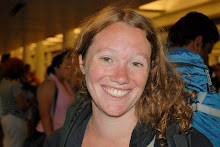This Thursday, I had my first day working for Las Madres. We spent the first hour and a half beginning our semester long project of summarizing declassified police files on note cards. Most of the madres are computer illiterate, so this will allow them to search through the police files quickly without having to use the internet filing system. It´s surprisingly difficult, because I actually have to synthesize rather than just comprehend Spanish. I find it really interesting to see exactly how the police were tracking Las Madres, and what they found important. At the same time, it´s definitely not the focus of our time there.
We spent the rest of our four hours listening to Carmen (our boss) telling her story. To summarize, the police kidnapped Carmen, along with her nephew, her daughter, and her daughter´s boyfriend, when they were eating dinner at Carmen´s apartment one night. Carmen spent three days in a basement somewhere outside Buenos Aires, enduring police violence, water and food deprivation, and the sight of her screaming, crying daughter after she had been tortured. After this time, the police released Carmen and her nephew, but they never saw her daughter or her daughter´s boyfriend again. This beginning part of the story was difficult just to hear, but Carmen told it matter-of-factly, like someone who had done so many times before.
She went on to discuss her subsequent search for her daughter, through which she discovered Las Madres, then an informal network meeting secretely in a church. As she explained their continued defiance of the military leaders, even after the founding members of the group were themselves disappeared, she concluded, ¨in the beginning, they called us the crazies of the Plaza de Mayo. And we were crazy. We didn´t know what we were doing. We were so stricken with grief that we didn´t understand we were confronting a dictatorshp. We just wanted our kids back.¨ Las Madres, according to her, started to get international attention when journalists in Buenos Aires for the soccer world cup began to film their march. The government tried to remove them, but Las Madres just kept marching. From here, they began travelling throughout the world (and continuing their activities in Argentina), helping to secure the international isolation and eventual downfall of the military regime.
As a side note, this is obviously a very personal story, and I might normally be hesitant to post this on a public blog. However, Carment emphasized repeatedly the importance of remembering, talking about, and passing on her experiences. In fact, it´s the main reason they have this internship program at all. Over the course of the semester, we´ll conduct recorded interviews with Carmen and two other mothers, and also do a presentation for all of FLACSO about Carmen and Las Madres.
As I listened to her story, two realizations struck me. First of all, these terrible things - things that Americans typically only read about in newspapers - happen to real people. I´ve only spent two days with her, but Carmen might be the most amazing person I´ve ever met. Her husband died young, so when her daughter disappeared, she was left completely alone. By her own account, Las Madres gave her a reason to keep living, and it is clear that the women involved, in addition to being badass dictatorship topplers, also provide a support network for one another. Despite all she´s been through, Carmen is a sociable, sarcastic, and downright cheerful person. She told us a great story about being strip searched in a New York airport because she has a metal leg and couldn´t communicate that in English, and then joked with us about meeting Argentinian boys and drinking beer on the job.
Second, it´s incredible how much damage governments have done to people. I think in America it´s easy to become apathetic, because the government, relatively speaking, doesn´t affect our daily lives much. But that´s only because we´re lucky enough to have a government that, despite its many problems, is stable, democratic and thus unable to get away with organized, systematic violence against large swaths of its population.
I can´t believe I have this much to say after having only spent one week at Las Madres. Expect more as I get to know the people and their stories more fully.
Subscribe to:
Post Comments (Atom)

2 comments:
unreal. i cannot believe this is your internship. cannot wait to come to argentina and actually see all these things...
Jenny?
Post a Comment